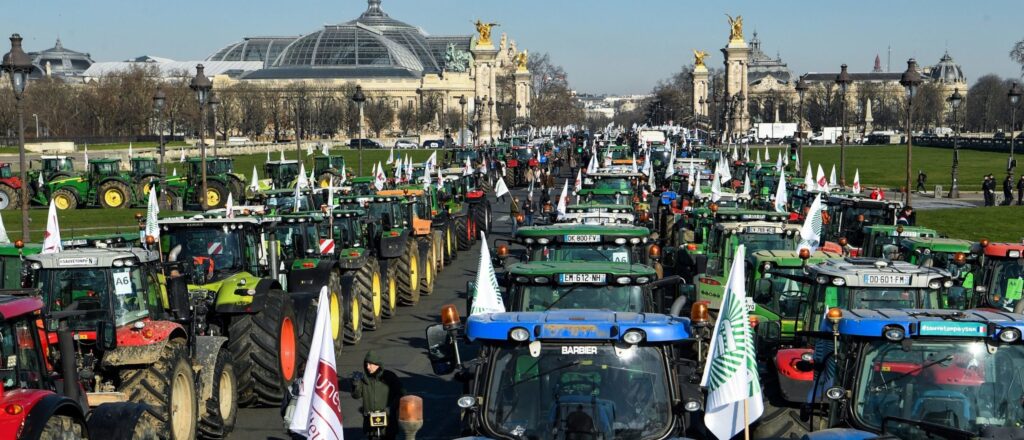- A new pesticide ban in New York is set to be signed by the governor, which some argue would be devasting to crops and impose burdensome costs on farmers.
- New York lawmakers believe the new bill will help prevent the loss of birds and bees that they argue are dying from the pesticides.
- “Instead of coating seeds with a tiny amount of pesticide and burying them in the ground where birds and bees can’t touch them, farmers will be forced to spray more pesticides indiscriminately aboveground,” said biologist Henry I. Miller.
A New York pesticide ban heading to Democratic Gov. Kathy Hochul’s desk could be devastating to farmers and crops throughout the state, according to scientists and farmers.
The Birds and Bees Protection Act, designed to decrease the loss of bees and birds to neonicotinoid pesticides, cleared both houses of the New York State legislature on June 9 and now awaits Hochul’s signature. Some farmers and experts object to the blanket ban, pointing to the devastating effects bans have had on crops in Europe and to the lack of evidence for the claimed damaging effects pesticides have on pollinators like bees. (RELATED: ‘It Has A Big Impact’: Davos Speaker Calls For ‘A Billion’ People To ‘Stop Eating Meat’)
“The vote to ban an entire class of pesticides and treated seeds is deeply concerning, especially because of the precedent it sets,” the New York Farm Bureau said in a June statement. “The Department of Environmental Conservation and its expertise should maintain the authority to properly review and register risk management tools, something the legislature is stripping away.”
Neonicotinoids, or neonics, are a widely used family of pesticides derived from nicotine and created in the 1980s that can be coated on the seed and planted rather than sprayed like many other pesticides. Critics claim neonics cause death, disruption or reproductive harm to pollinators like bees due to the fact that the pesticide lingers inside the plant after it has grown.
The bill relies on scientific research from a Cornell University study that was designed to provide a risk-benefit analysis of neonicotinoid insecticide use in New York State, according to a press release from New York State Assembly Speaker Carl Heastie. Heastie argues that there is a present danger to pollinators but not a big enough increase in income for farmers to warrant the use of the pesticide.
The press release claims that the study was state-funded, but the study itself says that funding was given by the Environmental Protection Fund, an activist organization that has spent millions of dollars in lobbying efforts since 1998.
A coalition led by the New York Farm Bureau (NYFB) released a statement against the bill in April. The NYFB makes the claim that prohibiting this technology goes against broader New York environmental goals, as seed coating technologies, like those used with most neonics, provide a superior method of disease control, and points out that the pesticide is also useful in non-agricultural applications.
In a statement to the Daily Caller News Foundation, the NYFB argued for their continued regulated use, saying, “Neonics are an insurance policy against crop damaging pests. … Some years it may not be necessary, but in the years that they are needed, treated seeds can save a crop. This point is lost on many lawmakers.”
Some experts have raised concern over the ban, pointing to neonics’ safety compared to sprayed pesticides as well as the failures in Europe over banning the pesticide, including the founding director of the FDA’s Office of Biotechnology and molecular biologist Henry I. Miller.
“For the past five years, an identical scenario has been playing out among European growers,” Miller said in the New York Post, pointing to the repeated need for derogations, or exceptions to regulations, of the European law banning the pesticide. “Sugar beet growers were among those devastated by the neonic ban. By 2020, farmers across 10 EU countries clamored for – and received – 21 derogations to protect their sugar beet crops from aphids spreading ‘beet yellows virus,’ a disease that decimated up to 80 percent of crop yields.”
“Instead of coating seeds with a tiny amount of pesticide and burying them in the ground where birds and bees can’t touch them, farmers will be forced to spray more pesticides indiscriminately aboveground,” Miller said.
Farmers stand next to tractors at the Esplanades des Invalides during a demonstration organized by unions including the National Federation of Farmers Union (Photo by BERTRAND GUAY/AFP via Getty Images)
“Without treated seed and applications of crop protectants, farmers would revert to planting fewer cover crops to avoid losses to seed Corn Maggot and other pests,” the NYFB statement reads. “Removing these tools would impact the state’s carbon footprint, requiring additional tractor passthrough and product to be applied,” going against sustainability goals set out by the New York Climate Action Council.
The ban comes as governments seek to crack down on farms over environmental standards, with Dutch farmers protesting after the Hague announced its plan to purchase 3,000 farms, in many cases forcibly, to meet European Union nitrogen emissions demands.
Farmers in France protested by driving tractors through the streets of Paris in February after a European Union court overturned a ruling that allowed French farmers to use neonics for sugar beets.
Speaker Heastie, Miller and bill sponsor state Sen. Brad Hoylman-Sigal did not respond to a request for comment.
All content created by the Daily Caller News Foundation, an independent and nonpartisan newswire service, is available without charge to any legitimate news publisher that can provide a large audience. All republished articles must include our logo, our reporter’s byline and their DCNF affiliation. For any questions about our guidelines or partnering with us, please contact licensing@dailycallernewsfoundation.org.


